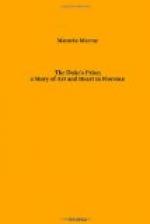“He is not. He lives.”
“What! will you say that others are saved beside you?”
“No.”
“How then can Ranadar live?”
“I am Ranadar!”
At that well known name the Turkish captain, laid his hand furiously upon his scimetar. The men who had been looking at the prisoner, or endeavoring to discern some living being upon the water, all turned as if by one impulse, to look at the dreaded corsair. He stood there with folded arms, glancing at them as haughtily and proudly as though he were victor, and not a captive.
“You Ranadar!”
“I am. I did that,” said he, pointing to the blackened fragments upon the water.
“What! You come here, you confess your name, and your atrocious deed? Do you hope to live?”
“No.”
“And you shall not be disappointed. Here, come forward,” said he, to some of his men, who were, armed with axes. “Hew the ruffian from limb to limb!”
“Do your worst, vile Turk! I scorn you, and laugh at death. Better it is to die than live in captivity!”
“Ha! say you so? Then I will bring down your proud spirit, and Ranadar the corsair shall be Ranadar the obedient slave! Men, bind him.”
“Look well to your bonds, then, for strong bolts and bars have before this failed to hold me.”
“Bind him! Gag him! Stop the mouth of the dog!” shouted the fierce Turk, in ungovernable fury. “Take him below, away out of my sight.”
And the corsair was bound and taken below.
The Turkish ship left this scene of destruction and proceeded on her way to Constantinople. There she landed, and over the city spread the news of Ranadar’s captivity, for his name was well known among the people. As he was brought ashore, a vast multitude assembled to have a look at the dreaded corsair. He looked around upon them, and save a slight smile of scorn, no emotion was visible upon his marble countenance.
The Turkish captain, whose name was Achmet, took him as his own slave, swearing that he would bring down his proud spirit, and tame him as he would a wild beast-by hunger. Accordingly, Ranadar was placed in a dungeon, whose moist floor, and dank, slimy walls showed it to be beneath the surface of the sea-far down under the ground.
He narrowly examined the dungeon in which he found himself confined. It was not more than ten feet square. At the side opposite from the door there was a small grating, through which entered some feeble rays of light. The iron stanchions were thick and strong, and beyond the first one which he saw, there was yet another. The aperture was about a foot square.
“Ha!” he exclaimed, when he first saw it. “That is what I wished for, Achmet will leave me here without food for three days. When he comes, perhaps the bird will be flown. My manacles are off! Good!-I can use my hands.”
He slowly unwound the scarf which was around his waist, and disclosed beneath its folds doubled cords of silk, which, if extended, might reach forty feet. He examined this, tried its strength carefully, and then tied it round him. he then took off his Fez cap, and from beneath the lining he pulled out some small instruments. There was a knife, and a saw of the finest and hardest Damascus steel.




